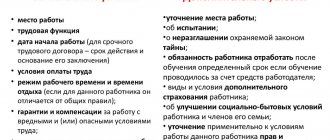An HR employee must know exactly what questions he should ask each specific candidate and what to ask the applicant during an interview.
For example, if you are hiring a call center operator, you need to find out whether he is able to easily cope with stressful situations.
And also, is he able to successfully establish contact with conflicting people? This may be necessary in his professional activities.
Pay attention to his social qualities, and the qualification component may fade into the background.
If you are interviewing teachers, of course, social skills may be very important, but the most important thing is that the candidate has professional education and specialized knowledge.
Types and purposes of questions
The main goal of the interview is to understand what a possible employee of the company is like. There are many types of questions that can be used to structure a conversation during an interview.
It is not surprising that many are interested in: what is asked most often during an interview? Job interview questions can be divided into several categories.
Open . Questions that involve extensive reasoning. By asking open-ended questions, you give the candidate the initiative and allow him to talk about himself as a person.
Are common . Questions that can be answered with a short “yes” or “no”. Designed to get a simple answer to the question posed.
Projective . By answering these questions, the candidate compares his experience with the actions of other people. Through the prism of the opinions of fictional characters, it allows you to find out the candidate’s personal attitude towards the person under consideration.
Reflective . They help you take the initiative. For example, if the applicant gets carried away with the answer, you can politely interrupt him with a question: “Okay, now we can move on to the next question, right?” A similar technique can also liberate a nervous applicant and encourage him to trust the recruiter.
Behavioral . Aimed at identifying the characteristics of the candidate’s character and the nuances of his behavior.
Suggestive . When the main part of the information is clarified, you can clarify some details with the help of leading questions. For example, you can tell that the company actively cooperates with branches in other cities, and at the same time ask how the applicant feels about long business trips.
Psychological . Strange questions that cause confusion among candidates. They allow you to analyze a person’s ability to switch from one to another and react quickly. This section also includes questions on intelligence. We talked in more detail about how to conduct psychological tests during an interview here.
It is necessary to win over the interlocutor for the conversation, to do everything possible so that he has a good impression of the conversation, because not only the candidate, but also the company that invited him receives an assessment during the conversation.
Read about the basic rules and methods of conducting an interview in this material.
And now, more about what is asked during a job interview or 10 questions that you may be asked.
Standard questions
- Please tell us about yourself.
- Why did you leave your last job?
- What does motivation mean to you?
- When does work give you the most pleasure?
- Where do you see yourself in a few years?
- What are your strengths?
- What are your weaknesses?
- What didn't suit you at your last job?
- What are your advantages over other candidates?
- Do you know anything about our company?
- Maybe you have questions for the company?
The following question often arises during an interview: where do you see yourself in 5 years or why do you want to work with us? It is better to think through the answers to them in advance.
Behavioral issues
- Tell me about a time when you weren't able to achieve the results you wanted. How did you cope with the task?
- Tell us about a successful project you led.
- If you do something wrong, how do you explain it to your boss?
- Tell us about the most difficult decision you have had to make in your career.
Projective
- What usually attracts people to work?
- Good worker. Describe it.
- What makes people work more efficiently?
- Why can you fire an employee?
- What guides people when they choose a specialty?
- Why do people want to have a successful career?
- To communicate effectively with people, what character qualities does a person need?
Biographical
- Tell us about your dreams.
- What grades did you get at school and university?
- Tell us about those professional victories that make you proud.
- In what cities did you live and conduct your professional activities?
- What is the most important thing you learned at university?
Tricky and insidious
- Why shouldn't we hire you to work with us?
- What did you have for dinner yesterday?
- How would you explain the color yellow to a blind person?
- How do you feel about social networks, how much time do you spend on them?
- If you were a superhero, what power would you have?
- What would you do if you were the only survivor of a plane crash?
Strange
- What fruit do you associate our company with?
- How to place an elephant in the refrigerator?
- Who is your favorite Disney princess?
- Do you have a developed sense of humor? If yes, tell me a joke.
- Will you continue to work for us if we stop paying you?
These questions can be categorized as: awkward questions.
These include such things as why we need an employee of this company, why we should hire you and others.
On logic, associations
- Why is the manhole cover round? Answer: so that it cannot fail during installation, the rectangular one will easily fit into the hatch body diagonally.
- How should you throw a tennis ball so that it comes back? Answer: up.
- How many times a day do the clock hands coincide? Answer: 22 times.
- If it's raining at 12, can you expect that the sun will come out exactly 72 hours later? Answer: No, it will be midnight again at this time.
About career and work in the company
- How would you like to develop your career?
- When would you be able to take on your new responsibilities?
- If you get the position, what goal will you set for yourself?
- Have you communicated with employers in other organizations?
- If we asked your previous boss what you need to learn, what would he say?
- What is your typical work day like?
About money
- What salary do you expect?
- What was your salary before?
- How much money do you expect to earn by the end of your first year with our firm?
- And in the third year of work?
Now you know what questions are asked during a job interview. And the recruiter should make a list of questions for a job interview. It may contain both standard questions and specialized ones.
We also talk here about what questions applicants are most often asked during an interview and how to answer them correctly.
From separate publications on our website you can learn about what group, structured and stress interviews are and how they are conducted.
Tricky questions and non-standard interview questions
They are often asked to test a candidate's ingenuity or technical knowledge. For example, one of the interview questions for a candidate for the position of global supply manager at Apple was: “How many children are born every day?” "You are smart?" — they asked the candidate for civil engineering.
“What is more important, solving a customer problem or creating a good customer experience?” — a question for a candidate for Apple At Home advisor.
More tricky interview questions:
- Do you keep a stash in a cookie jar?
- Find point G using binary search.
- How would you personally solve the problem of world hunger?
- What are five ways to use a stapler without staples?
- What is the value if 37 is multiplied by 37?
- You have a bouquet of flowers. How many flowers are in your bouquet if all but two of them are tulips, all but two are daisies, and all but two are roses?
Let's see how to act when faced with such questions:
- Buy time. Remember that you don’t have to voice your first reaction to it. If you are asked a question that is difficult in content, then ask to repeat it, or paraphrase it yourself and clarify the correct understanding. And then ask for a minute to think. This will give you much-needed time to collect your thoughts.
Wrong:
“I just don’t understand what you’re asking about”; “The question is so difficult that it is hardly possible to answer it in principle.”
Right:
“An interesting question, it was unexpected for me. Do I understand correctly that…"
- Break it down into parts:
A tricky question can usually be broken down into its parts and then asked which part to answer first. Practice shows that often complex questions are asked by recruiters who put the necessary information in the last part of their question. - Engage your interlocutor in thinking
.
It is very important to understand that the goal of a tricky question is to understand how you think rather
than to get the answer itself. Therefore, treat it as a joint reflection, involving the recruiter: just start looking for an answer, his reaction or participation will involuntarily show you how you are doing. - An open question can be turned to your advantage.
You can answer a question in such a way that it changes the meaning of what was asked.
This is exactly what the artist Diego Velazquez did when he was a painter at the court of King Philip IV. One day the king called him to his place and asked with concern:
- Tell me, maestro, what do you think about the conversations at court? They say that you can’t write anything but heads. This is true?
“Your Majesty does me too much honor with your question.” I have not yet met and do not know a person who could write heads the way I do.
A selection of successful answers to the recruiter’s pressing questions from the author of best-selling books on job search and employment topics, Vicky Oliver.
What questions are required?
In this part, we’ll talk about what questions to ask a candidate during an interview in any case. Let's consider those questions during a job interview that will be asked without fail.
In general, it is recommended that the HR department employee prepare questions for a job interview in advance, then the interview will be easier.
Be sure to ask about the applicant’s education and work experience. Ask why he is interested in your company.
Ask about the candidate's hobbies, ask a few tricky questions to test his reaction.
Pay more attention to the applicant's future, don't focus on his past work . What does he expect, what plans is he making?
It is better to resort to strange questions to defuse the situation, and tricky ones to test the candidate’s reaction in stressful situations.
Be sure to ask the candidate if they have any questions. It is necessary not only to listen to his answers, but also to tell him what interests him.
Descriptive (behavioural) questions
This type of question is becoming increasingly popular in interview situations. It is about your existing experience: what you have already done in a particular situation, not what you would do. The situations that the interviewer describes in the questions usually match the job description fairly closely. Some employers believe that examples of past performance will help them predict future performance in similar situations. There is no right or wrong answer to this type of question, but keep in mind that you must relate the answer to the job being offered. If you are interviewing for a research position, talk about a research project you have completed. If a sales representative, give an example of successful implementation of a sales plan or other achievement in this position, etc.
Example: “Give me an example of a work situation in which you were proud of your work.”
“While working as a summer sales representative for XYZ Company, I approached potential clients and convinced them of the environmental and economic benefits of recycling. I also kept a record of customer feedback to ensure they were satisfied with the services they received. I used both telephone and personal contacts and was able to increase sales by 34% compared to the same period last year.”
When preparing for this type of question, it is critical that you analyze the skills and qualities that the position will require and provide specific examples from your past that will demonstrate those qualities. Employers love this type of question because it directly relates to your experience. In essence, this is a direct question, but it requires a detailed answer describing a specific experience that you have had previously.
What should you not ask a candidate?
Refrain from asking too uncomfortable questions.
Do not ask about personal life, religion, nationality - such topics can scare off the candidate or turn him against you.
Don't ask questions directly. For example, the phrase: “Are you worried?” will make the applicant nervous, uncomfortable, and his anxiety will only increase.
Your goal is to create a friendly environment for a confidential conversation.
You need to communicate correctly and politely. Only in such an atmosphere will you be able to objectively assess the candidate’s capabilities.
We provided recommendations on how to properly prepare and conduct an interview with a candidate in a special article, and read about what unexpected and even tricky questions an employer may ask during an interview, read here.
Frequent changes of job/field of activity
If a candidate has not stayed in any of his places of work for a long time, this is a reason to think about his reliability. Most likely, he will leave your company just as quickly. And here it is important not only how soon the new employee submits his resignation, but also for what reasons.
Frequent job changes may indicate conflict, complexity of character, that is, the presence of those human qualities that negatively affect the work process. Because of this, the candidate fails to join the team, disputes and discontent occur, which leads to a change of job.
Pay attention to the areas of activity in which the candidate has worked. Dramatically different directions in work may indicate that it is difficult for a person to make a decision, he quickly burns out, gives up halfway, “jumping” from one position to a completely different one.
Significant deviations in expected salary
An indicator of experience and understanding of one’s own professionalism is the salary level that the candidate sets for himself. If the monetary compensation expected by the applicant deviates significantly from the market average, then you need to find out the true reasons for this discrepancy.
Perhaps the candidate is inexperienced and lowers his expectations, afraid to take big money for work of which he is not sure of the quality. Or the applicant simply does not monitor the market, which means he does not know the current prices for such services. This may indicate that he is not developing as a professional, since he does not “keep up” with the field of activity in which he works.
Stay tuned! In one of the following articles we will tell you how to independently select employees and conduct interviews.
And in order not to worry about recruiting employees at all, contact Lexintel! Leave a request for a free consultation with our specialist:
No questions about the place of work
An experienced and confident candidate never hesitates to ask questions about the vacancy that interest him. The absence of questions can only mean three things:
1) you spoke extremely comprehensively about the work yourself;
2) the candidate does not have sufficient experience, and therefore simply does not know what questions to ask;
3) the candidate is too shy and is in a “begging” position.
The latter is a negative factor for those types of positions that involve communicating with people, making responsible decisions, having subordinates, sales, etc.











